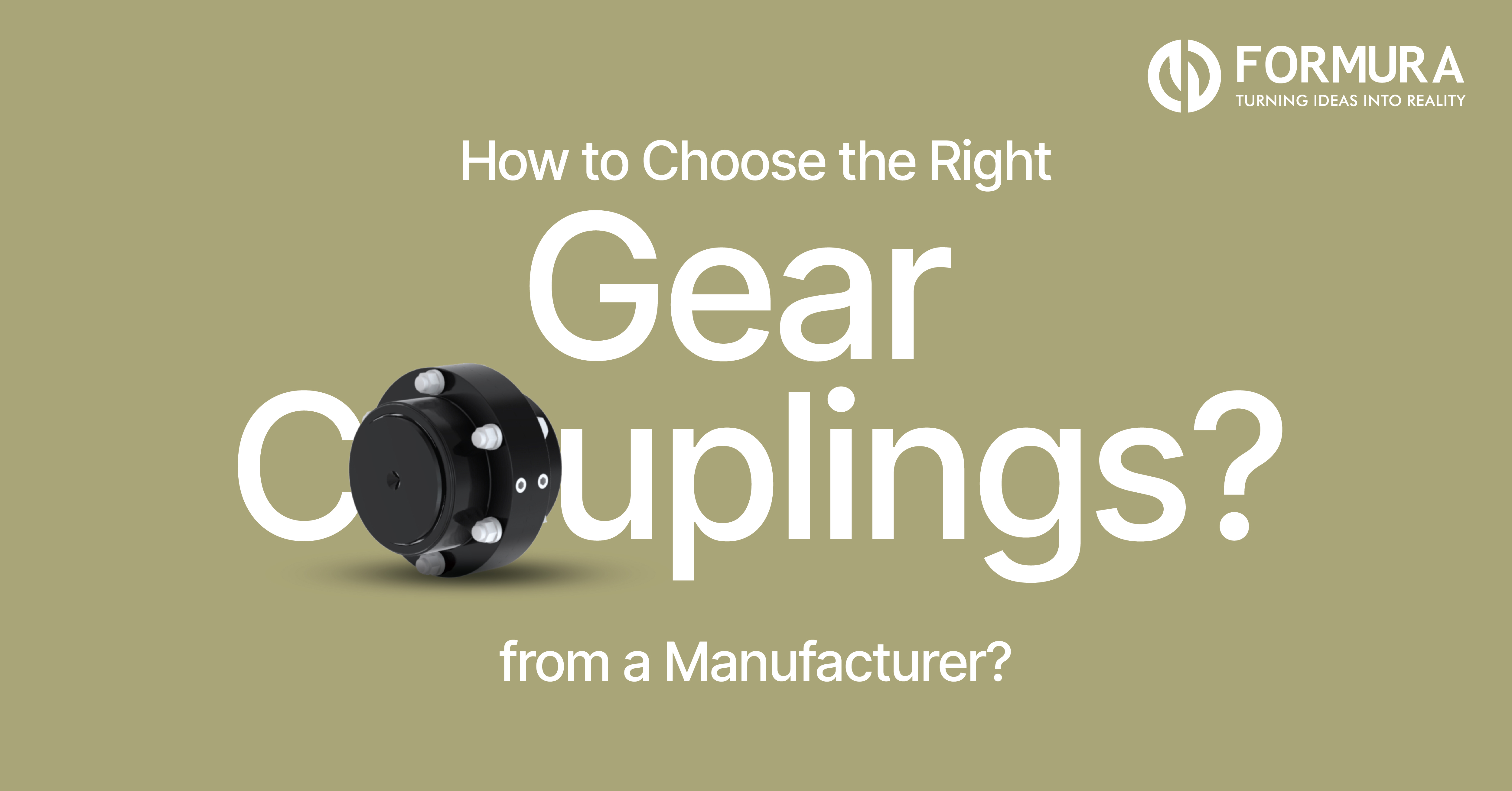How to Choose the Right Gear Coupling from a Manufacturer

In any industrial setup, efficiency, performance, and reliability are the cornerstones of success. At the heart of many mechanical systems lies a component that often goes unnoticed the gear coupling.
Whether it’s in manufacturing, mining, oil & gas, or power plants, gear couplings play a pivotal role in transmitting torque, accommodating misalignments, and maintaining mechanical integrity in harsh environments. Selecting the right gear coupling isn’t just a technical decision it’s a long-term investment in performance, safety, and reduced downtime.
In this gear coupling selection guide, we’ll help you understand what gear couplings are, explore their types and uses across industries, and offer tips to choose the right gear coupling so you can make the most informed decision when working with a gear coupling manufacturer or supplier.
Understanding Gear Couplings
What is a Gear Coupling?
A gear coupling is a mechanical device designed to transmit torque between two shafts that are not perfectly aligned. It comprises two hubs with external gear teeth, which mesh with internal gear teeth on flanged sleeves. This design allows the coupling to handle slight shaft misalignments while maintaining torque transmission and rotation.
Key Components:
- Hubs: (attached to the shaft)
- Sleeves: (housing internal gears)
- Gears: (mesh to allow power transmission with flexibility)
Types of Gear Couplings
Understanding gear coupling types is crucial when matching the coupling to your application:
- Full Gear Couplings – Handle angular, axial, and parallel misalignment. Widely used in heavy-duty industrial applications.
- Half Gear Couplings – One half is rigid, the other flexible. Ideal for applications with limited misalignment.
- Floating Shaft Couplings – Used when large shaft gaps are involved, like in cooling towers.
- Spacer Gear Couplings – Provide space between shafts for easy maintenance.
Each type has its own advantages and specific use cases, which makes working with the right gear coupling manufacturer essential for guidance.
Key Factors to Consider When Choosing a Gear Coupling
Choosing the right gear coupling requires understanding several technical and environmental variables. Here’s what to keep in mind:
1. Load Capacity & Torque Requirements
Determine the maximum torque your application demands, including safety margins. Gear couplings should handle startup loads, shock loads, and peak torque efficiently.
2. Shaft Misalignment Tolerance
Even in precision engineering, misalignment is inevitable. Check how much angular, parallel, and axial misalignment the coupling can accommodate without performance loss.
3. Speed & RPM Considerations
Ensure the coupling is rated for your system’s operating speed. Higher RPMs require precise balancing and low backlash to reduce vibration and wear.
4. Environmental & Operational Conditions
Is the application exposed to dust, chemicals, extreme temperatures, or water? Choose gear couplings that are resistant to corrosion and fatigue. Look for sealed designs where needed.
5. Material & Durability
Stainless steel and high-alloy steel offer strength and corrosion resistance. For lighter-duty or cost-sensitive applications, nitride or treated steel may suffice.
6. Maintenance & Service Life
Ask your gear coupling supplier about service intervals, lubrication needs, and spare parts availability. Some couplings are designed for quick disassembly and ease of maintenance.
Also Read :
Why Use Gear Couplings? Gear Coupling Benefits and Advantages Explained
Common Applications of Gear Couplings
Gear couplings are widely used across industries where precision torque transmission and durability are non-negotiable. Here are some examples:
- Manufacturing & Steel Mills: Rolling mills, presses, and conveyors.
- Automotive Industry: Test rigs, transmission systems.
- Oil & Gas: Drilling equipment, pumps, compressors.
- Marine Propulsion: Driveshafts in vessels and submarines.
- Power Generation: Turbines, alternators, and heavy-duty motors.
- Paper Mills & Textile Industry: High-speed rotating machinery.
This makes understanding industrial gear coupling applications essential when designing or upgrading systems.
How to Select a Reliable Gear Coupling Manufacturer
Not all gear coupling manufacturers or industrial coupling suppliers offer the same quality, customization, or after-sales support. Here's how to choose the best one:
1. Certifications & Industry Standards
Look for manufacturers that comply with ISO, AGMA, or DIN standards. This ensures quality, precision, and interchangeability.
2. Customization Options
Does the manufacturer offer tailor-made coupling solutions for non-standard shaft sizes or unique alignment needs? Customization indicates engineering expertise.
3. Reputation & Customer Reviews
Check industry forums, Google reviews, and testimonials. Reliable coupling product retailers will have a track record of satisfied clients.
4. After-Sales Support
A good gear coupling dealer will offer installation support, training, warranties, and a ready supply of spares.
Common Mistakes to Avoid
Even seasoned professionals sometimes make errors that can result in poor performance or premature failure. Avoid these pitfalls:
- Overlooking Misalignment Tolerance: Choosing a rigid coupling when your system needs flexibility will lead to failure.
- Ignoring Environmental Factors: Corrosion or heat damage is common if materials aren’t selected properly.
- Choosing Cost Over Quality: A cheaper coupling might save now but cost you more in downtime and repairs later.
Always consult with experienced gear coupling suppliers who understand your industry and application.
Why Use Gear Couplings? (Advantages)
- High Torque Capacity: Gear couplings can handle large torque loads in compact designs.
- Misalignment Handling: Unlike rigid couplings, they allow for axial and angular misalignment.
- Durability: Properly maintained, gear couplings offer long service life even in demanding environments.
- Compact & Efficient: Minimal backlash and precise engagement for high-performance applications.
These features make them a preferred choice for industries that cannot afford downtime.
Conclusion
Choosing the right gear coupling is critical for the efficiency, reliability, and longevity of your machinery. With countless options in the market, the selection process can be complex but with the right gear coupling selection guide, you’re one step ahead.
At Formura, we specialize in engineering-grade coupling solutions tailored to your application. As a trusted gear coupling supplier and manufacturer, we help industries select and install the right product — ensuring optimal performance and minimal maintenance.
Ready to Choose the Right Gear Coupling?
Contact Formura today – your reliable industrial coupling supplier for custom-engineered gear couplings and unmatched support.